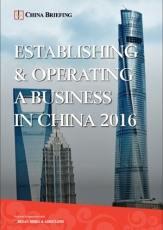China Market Watch: Elderly Care Market Opens to Private Investment and State Monopoly on Salt Lifted

China to fully open elderly care market to private investment
China has announced plans to ease restrictions in the elderly care market in order to channel more private capital into the sector. Market access thresholds will be lowered, and state run elderly care institutions will be reformed as part of the measures. Improving and developing the elderly care sector has been identified as a pressing topic by the state, as China’s elderly population has already surpassed the international standard of defining an aging population, which is held at 10 percent of the population over the age of 60. At the end of 2015, China had 222 million citizens over the age of 60, over 16 percent of the population. This percentage had already passed the 10 percent threshold in 1999. It is estimated that total spending on the elderly care will reach RMB 5 trillion by 2050.
Electric car development road map to be unveiled
China will issue its first new energy vehicle industry development roadmap in December in an effort to make provisions for future development of the world’s largest electric car market. The drafting of the roadmap was conducted by the China’s Society of Automotive Engineers, and is currently undergoing government review and adjustments. New energy vehicle research and development will feature high on the development plan, with mild hybrid technologies proposed as a means to cut fuel consumption and emissions. If mild hybrid cars are listed along with energy saving vehicles, buyers will enjoy substantial purchase tax cuts. In addition, the Ministry of Industry and Information Technology is about to implement a dual-credit scheme for mandatory new energy vehicle production.
 RELATED: Pre-Investment and Entry Strategy Advisory from Dezan Shira & Associates
RELATED: Pre-Investment and Entry Strategy Advisory from Dezan Shira & Associates
China to remove price control over salt market
China’s top economic planner has announced that price controls on the salt market will be removed. Private investors will now be allowed to enter the market by joining with existing salt companies. The state has had a monopoly on the commodity for over 2,000 years, and removing it will encourage competition and increase product quality. China has seen an oversupply of salt in the last few years, with over 300 registered producers and 4,000 distributors. Local governments and companies are preparing for the policy’s implementation. Emergency measures will be taken to maintain market stability by preparing for the event of a salt shortage and rising prices, especially in remote and poorer areas.
Baidu announces RMB 20 billion investment fund for tech projects
Internet search engine, Baidu Inc., has announced that it will invest RMB 20 billion in internet technology projects. The fund will be mostly aimed at mid and late stage technology deals, with contributions made by insurance funds, securities companies and government-backed investment institutions. Baidu has been making efforts to diversify its services and revenue sources recently, having just formed an RMB 1.3 billion venture capital unit. However, former efforts have not proven so successful, such as ventures into third-party payments and online shopping. Furthermore, Baidu’s income has been in decline since it received a government reprimand after allowing gambling advertisements on its search engine platform, causing its biggest drop in quarterly earnings since its listing on the Nasdaq Stock Market in 2005.
|
Asia Briefing Ltd. is a subsidiary of Dezan Shira & Associates. Dezan Shira is a specialist foreign direct investment practice, providing corporate establishment, business advisory, tax advisory and compliance, accounting, payroll, due diligence and financial review services to multinationals investing in China, Hong Kong, India, Vietnam, Singapore and the rest of ASEAN. For further information, please email china@dezshira.com or visit www.dezshira.com. Stay up to date with the latest business and investment trends in Asia by subscribing to our complimentary update service featuring news, commentary and regulatory insight.
|

 Establishing & Operating a Business in China 2016
Establishing & Operating a Business in China 2016
Establishing & Operating a Business in China 2016, produced in collaboration with the experts at Dezan Shira & Associates, explores the establishment procedures and related considerations of the Representative Office (RO), and two types of Limited Liability Companies: the Wholly Foreign-owned Enterprise (WFOE) and the Sino-foreign Joint Venture (JV). The guide also includes issues specific to Hong Kong and Singapore holding companies, and details how foreign investors can close a foreign-invested enterprise smoothly in China.
 An Introduction to Doing Business in China 2016
An Introduction to Doing Business in China 2016
Doing Business in China 2016 is designed to introduce the fundamentals of investing in China. Compiled by the professionals at Dezan Shira & Associates in June 2016, this comprehensive guide is ideal not only for businesses looking to enter the Chinese market, but also for companies who already have a presence here and want to keep up-to-date with the most recent and relevant policy changesSelling, Sourcing and E-commerce in China 2016
 Selling, Sourcing and E-Commerce in China 2016 (First Edition)
Selling, Sourcing and E-Commerce in China 2016 (First Edition)
This guide, produced in collaboration with the experts at Dezan Shira & Associates, provides a comprehensive analysis of all these aspects of commerce in China. It discusses how foreign companies can best go about sourcing products from China; how foreign retailers can set up operations on the ground to sell directly to the country’s massive consumer class; and finally details how foreign enterprises can access China’s lucrative yet ostensibly complex e-commerce market.
- Previous Article La complejidad de los precios de transferencia en servicios entre empresas
- Next Article China-Philippine Relations: Implications for Foreign Investment









